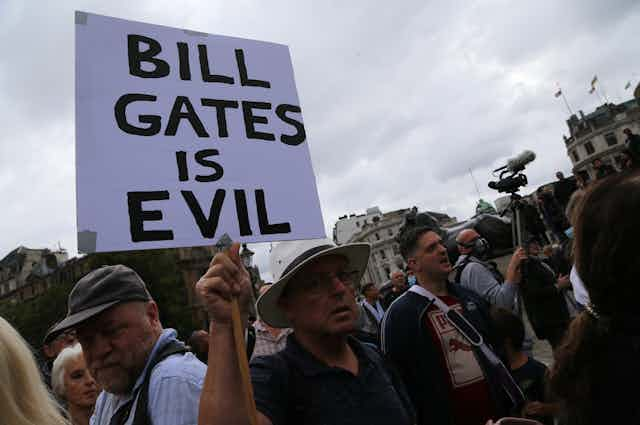Over the last two decades, and in particular over the last five years, there has been a growing scientific interest in conspiracy theories and people who believe in them. Although, some may think belief in such stories is linked to intelligence, research is beginning to show that how people think could be more important.
Scientists agree that having a measure of skepticism about official accounts of events is healthy and important, but conspiracy theorising can lead to dangerous consequences for the individual and for society.
Some conspiracy theories, for example the QAnon conspiracy, can be considered a minority belief, with a 2021 YouGov poll showing that 8% of those polled in the UK endorsed this conspiracy theory. However, some beliefs are more widespread. A 2018 survey of people from around Europe found 60% of British participants endorsed at least one conspiracy theory. So, who are the people who are more susceptible to conspiracy theorising?
There is a dramatically growing body of research endeavouring to understand this question. First, let’s re-examine those assumptions about who engages with conspiracy theories.
People with high education levels, such as doctors and nurses, have been reported to propagate conspiracy theories. So it’s not just about intelligence – education won’t necessarily make you immune.
Read more: How morbid curiosity can lead people to conspiracy theories
Critical thinking
Research shows that our thinking style can be predictive of susceptibility to conspiracy theories. The dual processing theory of cognitive style suggests that we have two routes which we can use to process information.
One route is the fast, intuitive route which leans more on personal experiences and gut feelings. The other route is a slower, more analytical route which instead relies on elaborative and detailed processing of information.

What you tend to see is that people who are not necessarily smarter but who favour the more effortful, analytical thinking style are more resistant to conspiracy beliefs. For example, a British 2014 study found that those who scored highly for questions such as “I enjoy problems that require hard thinking” were less likely to accept conspiracy beliefs. It also found those who were less likely to engage in effortful thinking styles and more likely to use intuitive thinking showed a higher belief in conspiracy theories.
Similarly, a 2022 study across 45 countries used a cognitive reflection test, which measured engagement in analytical thinking in three questions. It found that participants who engaged in the labour intensive thinking style were less likely to endorse COVID 19 conspiracy theories.
Critical thinking is a valuable skill, particularly within education, and has been shown to buffer susceptibility to conspiracy beliefs. This is probably because this more arduous thinking style allows people time to identify inconsistencies in theories and look to additional resources to verify information.
Thinking style is not the same as intelligence
A 2021 meta-analysis study indicates that an intuitive thinking style is unrelated to intelligence. So, even really smart people could be susceptible to conspiracy beliefs – if they are more inclined to revert to faster, intuitive thinking styles.
Research shows that belief in conspiracy theories is predicted by cognitive biases that come from a reliance on mental shortcuts when processing information. First, conspiracy beliefs seem to be predicted by the flawed belief that big events must have big consequences.
This is known in psychology as proportionality bias. It is difficult to accept that events which have such world-changing consequences (for example, the death of a president or the COVID-19 outbreak) can really be caused by comparably “small” causes (for example, a lone gunman or a virus). This is how thinking styles reliant on gut feelings and intuition can lead people to endorse conspiracy theories.
Another example of intuitive thinking styles influencing conspiracy beliefs is the conjunction fallacy. A conjunction fallacy is the erroneous belief that the likelihood of two independent events occurring together is higher than the probability of the events occurring alone. Have a try at the Linda Problem:
Linda is 31 years old, single, outspoken, and very bright. She majored in philosophy. As a student, she was deeply concerned with issues of discrimination and social justice, and also participated in anti-nuclear demonstrations. Which is more probable?
a) Linda is a bank teller.
b) Linda is a bank teller and is active in the feminist movement.
The most probable is a) Linda is a bank teller as, statistically, the probably probability of one event occurring is always higher than the combination. However, research shows that higher conjunction fallacy errors are associated with stronger conspiracy beliefs. So people prone to conspiratorial thinking would be more likely to say b.
Exposure to conspiracy beliefs have also consistently been shown to increase people’s susceptibility to them, even if they don’t realise that they have had a change in belief.
It may sound concerning that anyone could be susceptible to conspiracy beliefs. However, these studies are helping researchers find interventions which can increase analytical and critical thinking styles and so buffer against susceptibility to such beliefs. A 2023 review of 25 different studies found these types of interventions were a promising tool to tackle the dangerous consequences of conspiracy beliefs.
The more we understand about the psychology behind conspiracy theories, the better equipped we are to tackle them.


